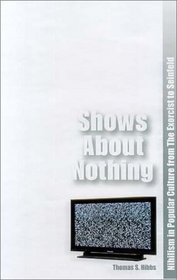Search -
Shows About Nothing: Nihilism in Popular Culture from The Exorcist to Seinfeld
Shows About Nothing Nihilism in Popular Culture from The Exorcist to Seinfeld
Author:
The portrayal of evil in film and television, frequently denounced as an attack on "family values" and an incitement to real-life violence, is more complicated and more disturbing than we realize. In a pointed challenge to both Hollywood and its critics, Professor Thomas Hibbs argues that the demonic anti-heroes and seductive comic evil of popul... more »
Author:
The portrayal of evil in film and television, frequently denounced as an attack on "family values" and an incitement to real-life violence, is more complicated and more disturbing than we realize. In a pointed challenge to both Hollywood and its critics, Professor Thomas Hibbs argues that the demonic anti-heroes and seductive comic evil of popul... more »
ISBN-13: 9781890626358
ISBN-10: 189062635X
Publication Date: 12/15/2000
Pages: 196
Rating: ?
ISBN-10: 189062635X
Publication Date: 12/15/2000
Pages: 196
Rating: ?
0 stars, based on 0 rating
Publisher: Spence Publishing Company
Book Type: Paperback
Other Versions: Hardcover
Members Wishing: 2
Reviews: Amazon | Write a Review
Book Type: Paperback
Other Versions: Hardcover
Members Wishing: 2
Reviews: Amazon | Write a Review
Genres:
- Nonfiction >> Philosophy >> General
- Nonfiction >> Philosophy >> Good & Evil
- Nonfiction >> Social Sciences >> Popular Culture
- Humor & Entertainment >> Movies >> History & Criticism
- Humor & Entertainment >> Television >> History & Criticism




